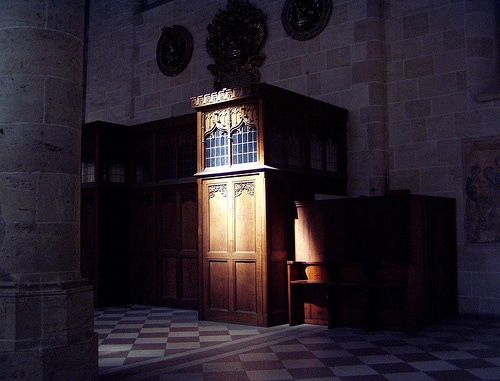Yesterday I taught on the spiritual discipline of confession . I mentioned that in many ways I think it is the hidden gem in the Christian’s tool belt. I grew up in a Presbyterian church that had a liturgical worship style. I can remember growing up and always having a time of confession during our church service. It always seemed rote and dead, but that was the analysis of a 12 year-old who knew it all. However, this declaration of confession was something that peaked my curiosity.
. I mentioned that in many ways I think it is the hidden gem in the Christian’s tool belt. I grew up in a Presbyterian church that had a liturgical worship style. I can remember growing up and always having a time of confession during our church service. It always seemed rote and dead, but that was the analysis of a 12 year-old who knew it all. However, this declaration of confession was something that peaked my curiosity.
As I grew up and dove more into theology, I really wrestled with the idea of confession. It didn’t seem to jive with the reality that Jesus paid for my sins; past, present, and future. I was convinced that when I placed my faith in Him that I was washed clean. So, I wrestled with the place that confession had in the Christian life (if any!). If I was forgive already, why did I need to recount all my sins and ask for forgiveness? It was only when I realized that confession was more for me than it was for God that I started to get a glimpse of why God was inviting me… even beckoning me, to confess my sin.
I wasn’t being asked to confess my sin in order to be forgiven… I was being invited to confess my sin because I was already forgiven.
That’s a big difference!
One of the ways we see this truth most clearly in scripture is in the narrative of the Prodigal Son (Luke 15). The son sins against his father, takes his inheritance and squanders it in a far away land, and then decides to come home. This act of coming home is a picture of repentance. It’s a changing of mind/heart that leads to a change in behavior. If you know the story, you know that the son has a speech prepared for his dad. Listen to what he plans on saying,
18 I will arise and go to my father, and I will say to him, “Father, sI have sinned against heaven and before you. 19 I am no longer worthy to be called your son. Treat me as one of your hired servants.”’
That’s a good speech, but the father doesn’t even give him the chance to get the words out of his mouth! He’s looking. He’s waiting. And, when he sees the son walking down the road he runs to meet him. It’s as though he really doesn’t need to hear the words, he’s far more interested in the fact that his son is home. See, confession (the son’s coming to terms with the reality of the way that he hurt himself and his father) is far more for us than it is for the Father.
The act of confession and repentance brings me back to the reality that God is gracious and I am still in need of his grace. It reminds me that he has been and will continue to be good to me. It reminds me that he runs to me. It reminds me that he designed me for freedom. See, the punishment for sin is taken away when we place our faith in Jesus, the power of sin is removed at confession!
No one who follows Jesus and knows him would say that if we were to die today and had one overlooked and unconfessed sin in our life that we would be prevented from going to heave. In fact, I think that (confess in order to be forgiven) mindset actually perpetuates a works based idea of salvation. No, Jesus paid it all and my faith in him is what saves… not my ability to recognize and recount all the sins that I commit.
During one of the services yesterday I mentioned a prayer that Ignatius of Loyola developed called the Prayer of Examen. It is a way to prayerfully reflect on one’s day; to intentionally pause and look for the fingerprints of God, to realign oneself with the reality that God is present, to confess and repent, and to seek to live in the fullness that God created us for.
This is a version of the five-step Daily Examen that St. Ignatius practiced.
1. Become aware of God’s presence.
2. Review the day with gratitude.
3. Pay attention to your emotions.
4. Choose one feature of the day and pray from it.
5. Look toward tomorrow.
I hope it’s helpful to you as you explore confession, repentance, and as you learn to live under the waterfall of grace.

